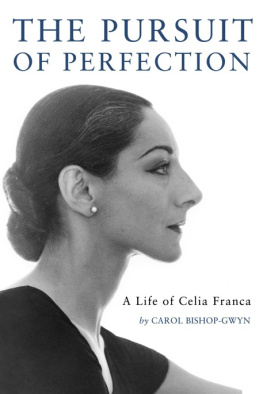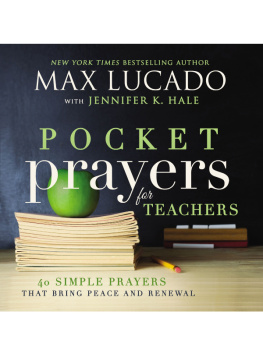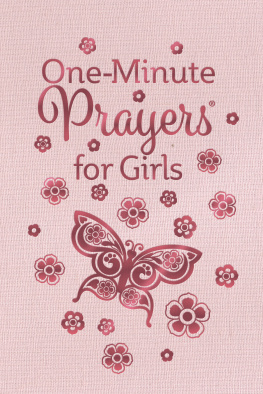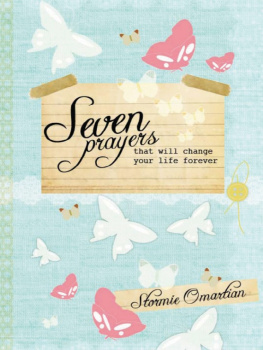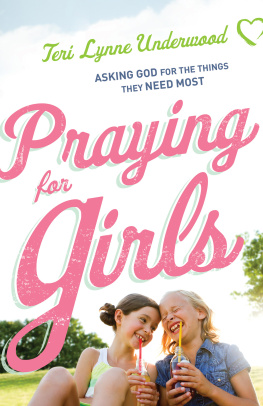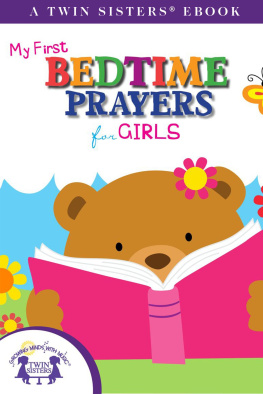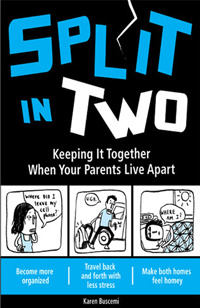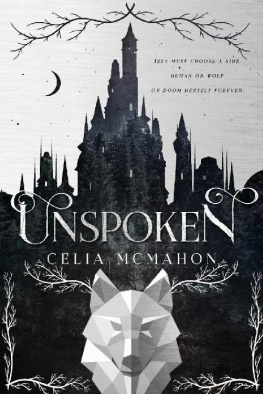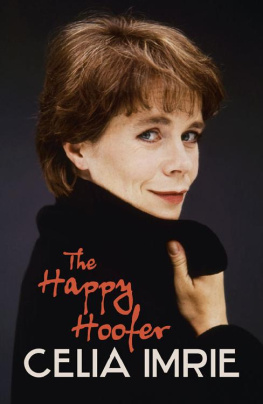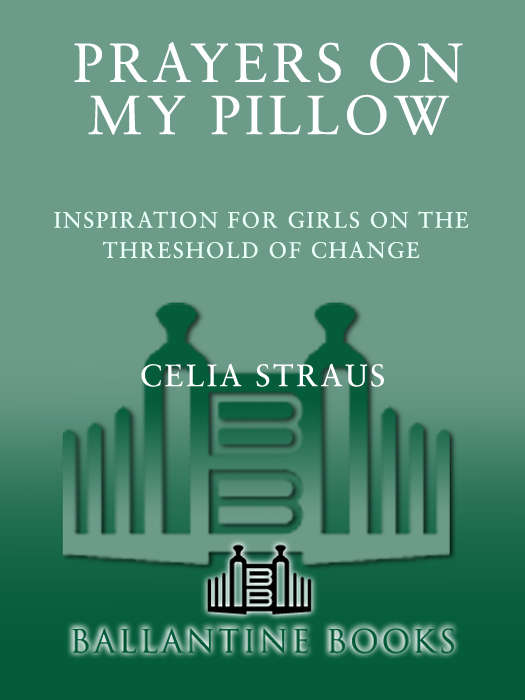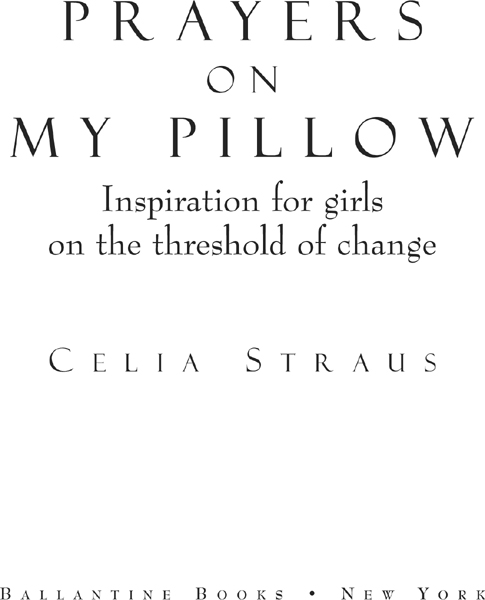For my girls, Julia and Emily, and for girls everywhere.
Contents
Acknowledgments
These prayers were written out of love for my daughters. However, I would not have been able to offer them to other girls without the help of Cherie Burns, my friend and literary agent, who first saw them as a book and Joanne Wyckoff, my wise and wonderful editor at Ballantine, who brought them to publication. I also wish to thank the following for their help and encouragement: Caroline Bain, Josh Baran, my father, Ray Brim, Katherine Brim, Susan Piver Browne, Linda Chambers, Melinda Curly, Chaplain Norm Folkers, Chris Jones, Erika Leiberman, Father Berard Marthaler, Reverend Sandra Mayo, Toby and Carol Marquez, Kathy McGloughlin, Shannon Mizell, Maggie Petito, Dennis Reeder, Irina Reyn, Tina Salvesen, Paula Silver, Charyn D. Sutton, Reverend Elizabeth Orens and Reverend Amy Yount of the National Cathedral School, and all those girls and mothers who read and responded to the prayers as this book was being compiled. Most of all, for making this bookand my familycomplete, I am grateful to my husband, Richard. Finally, as a daughter, I thank my mother, Patricia Brim, for she, too, answered prayers.
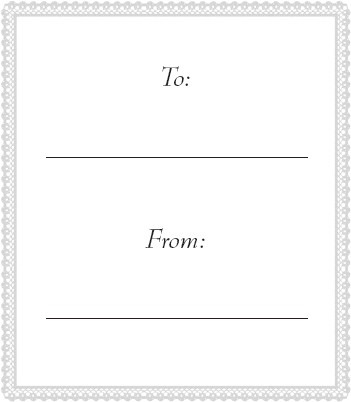
Why I Wrote the Prayers
P rayers on My Pillow was written for my older daughter, Julia. I started writing the prayers in the fall of 1995, when, at age twelve, Julia began experiencing many of the physical and emotional changes of young adolescence. A brave, happy, independent, and outgoing girl was fast becoming vulnerable, confused, and withdrawn right before my eyes. At the same time, as a self-employed writer for television, I was carrying a heavy workload. It seemed that, as the days went by, there was less and less time to talk with Julia, and more and more need to do so.
There also seemed to be new barriers to overcome every time we did talk. Suddenly my previously valued and much sought after opinions, observations, witticisms, and advice were off-base, outdated, and boring. Suddenly I wasnt listening properly, was hopelessly out of it, or didnt understand. And Julia, who up until now had been forthcoming and honest about what she was feeling, began responding to my inquiries with a whatever or a silent shrug of the shoulders.
Wed had a tough summer. Julia had found few friends to hang out with at the beach, so she had spent most of her time alone. Then she and I were in a frightening car accident in which the car was totaled, though neither of us was hurt. We both realized our mortality at the same moment, and the realization stayed with us. I think we also both realized that our relationship, built on communication that was continual and close, one that had nurtured and supported Julia throughout her young life, was changing. The connections between us were breaking down. Even more important, the connections within Julia herself were breaking down. Because of numerous factors including age, sex, society, school, and the accelerated pace of life in the nineties, Julias sense of self, her very essence, was threatened.
As I think back, it was Julia who asked me to write the first prayer. Were not a particularly religious family. Im Christian, brought up Episcopalian, and my husband is Jewish. Like many interfaith couples who marry and have children, we dealt with our religious differences by pretty much avoiding the topic entirely. Not going to church or synagogue. Celebrations of Christmas and Passover focused on secular rituals and family traditions, and observance of Easter, Yom Kippur, or Rosh Hashanah was nonexistent.
I had taught Julia and her younger sister, Emily, one bedtime prayerthe only one I ever prayed when I was a child. Its from a 1920 childrens book called The Bam Bam Clock, by J. P. McEvoy. It goes like this:
Bless me, God, the long night through,
And bless my mommy and daddy, too,
And everyone who needs Your care,
Make tomorrow bright and fair,
And thank You, God, I humbly pray,
For all You did for me today.
It did the job for ten years. But during that busy, tumultuous autumn, when I was preoccupied with work and Julias troubles were mounting, she asked me to write her a new one. One that might help her go to sleep instead of staying up until one or two in the morning worrying about well, everything.
And so I did. The next day I wrote a prayer, in verse. Im not a scholar of religion or a person of the cloth. I believe in an Infinite Being whom I call God, an afterlife, and the power of prayer. Im not a poet. I write television dramas, documentaries, and educational videos. Occasionally, Ive worked on a novel. But I do know the profound difference between writing from the head and writing from the heart. This first prayer and all the hundreds after it came from the heart. And that night I put the first prayer on Julias pillow.
Each day thereafter, whether we had had a chance to talk or not, I wrote a prayer for her to pray before she went to bed. Sometimes we read them together, sometimes she read them by herself, sometimes we talked about them. And I learned how important they were to her when, one night when I didnt write one, she asked me where her prayer was. I was careful to write the prayers in the words and voice that she might have chosen for herself. Some were tools to help her handle crises in her life; others were written as celebrations of her victories. Some were meditations on life cycles and the importance of acting in faith and love; others were more lighthearted and emphasized perspective and balance in order to get beyond the intense self-absorption of her adolescence.
I wrote the prayers having been deeply impressed by Mary Piphers Reviving Ophelia and Peggy Orensteins School Girls, books that stressed the need for parents to maintain connections with daughters during the early years of adolescence. I was also inspired by Larry Dosseys book Healing Words: The Power of Prayer and the Practice of Medicine, all of Max Freedom Longs books about Huna, especially Growing into Light, Enid Hoffmans Huna, a Beginners Guide, Thomas Moores Care of the Soul, and the writings of Reverend Sandra Mayo.
The prayers are nondenominational and are based on a very basic three-part concept. First, they acknowledge the existence of an Infinite Deity or Absolute Being, who is addressed as either God or Lord. Second, they look at life from the perspective of the girl who is praying. And third, they acknowledge and respect the girls inner self, or soul. Each prayer then connects and integrates the three. The process is simple and powerful. In the three-part concept there is a replacement of negative feelings or thoughts with a positive act of faith.
No matter what life issue a prayer addressesa problem to be solved, an anticipated challenge, gratitude, celebration, awareness of the beauty of nature, despair, loneliness, boredomthe process is the same. An experience or perception of a young teenage girl along with her ensuing emotions is recognized and then put into the context of, or sandwiched between, Inner Self and God.
Within that loving and secure framework, the prayers gently remind the reader of what she is capable. They present truths and values she can trust and rely on, such as fearless faith, love, self-reliance, self-empowerment, and ethical behavior. Many also express the benefits of courage, generosity, humor, creativity, and risk taking.


